Imagine lying in bed after a long day, with the world outside quiet. Your sheets gently welcome you to rest. But for many, this peaceful scene is hard to reach, with restless nights and sleepless hours getting in the way.
Creating the perfect sleep environment is key for quality rest. It affects our mood and health. Research shows that things like temperature, light, and noise can greatly improve our sleep and well-being. Making a few changes in your bedroom can lead to big results, making perfect sleep more achievable than you think.
With a little effort, you can develop healthy sleep habits. This leads to restorative rest, waking up refreshed and ready for the day. Let’s look at practical tips to improve sleep quality in your own sanctuary1.
Key Takeaways
- Optimizing your sleep environment is crucial for achieving quality rest.
- A comfortable mattress and bedding can drastically reduce sleep disruptions.
- Maintaining a sleep temperature between 60 to 67 degrees Fahrenheit is ideal for quality sleep.
- Minimizing light exposure can enhance melatonin production and improve sleep quality.
- Effective noise reduction techniques can lead to deeper sleep and fewer awakenings.
Understanding the Importance of a Sleep Environment
A good sleep environment is key to your health. Circadian rhythms control our sleep patterns. Temperature, light, and noise greatly impact sleep quality and mental health.
Keeping your bedroom at 65 degrees Fahrenheit (18.3 degrees Celsius) helps sleep. Light from screens and bright lights at night can wake you up and disrupt deep sleep2.
Noise is also crucial. Low noise levels can make sleep lighter, leading to more wake-ups2. To sleep better, manage noise levels well.
Experts say a clean sleep space is important. It reduces allergens and irritants. Washing bedding regularly is beneficial2.
Wash sheets at least every two weeks. If you share your bed with pets or sweat a lot, wash them more often2.
Creating a calm atmosphere helps sleep better. Lavender essential oil can improve sleep and make you feel refreshed2. Stress management, like setting daily priorities, also boosts sleep quality3.
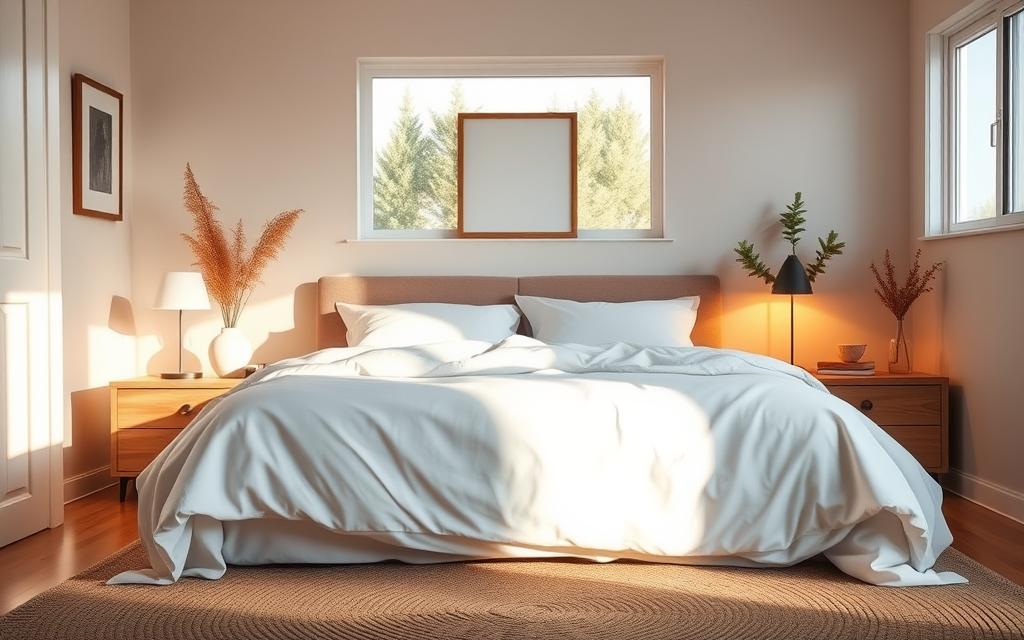
Optimizing Temperature for Better Sleep
Knowing how temperature affects sleep is key for a good night’s rest. The ideal room temperature for sleep is between 60°F and 65°F (15.6°C to 18.3°C). This range is crucial for better sleep quality45. Comfortable bedding helps keep your body temperature stable, making it easier to fall asleep.
Recommended Sleep Temperature
Infants need a room temperature of 60°F to 68°F (16°C to 20°C). Older adults might prefer it a bit warmer, between 68°F and 77°F (20°C to 25°C)4. A cooler room can improve sleep quality by 5% to 10% if it’s not too hot4. Keeping your bedroom cool helps your body cool down naturally, starting about two hours before bedtime5.
Adjusting Bedding for Comfort
Using breathable fabrics for bedding helps keep the temperature right. Cooling pillows can also improve sleep, keeping your head cool for better rest5. If you’re used to warmer rooms, slowly lower the temperature by 2 to 3 degrees to get to the best range5. These tips can help you create a great bedtime routine, leading to better sleep.
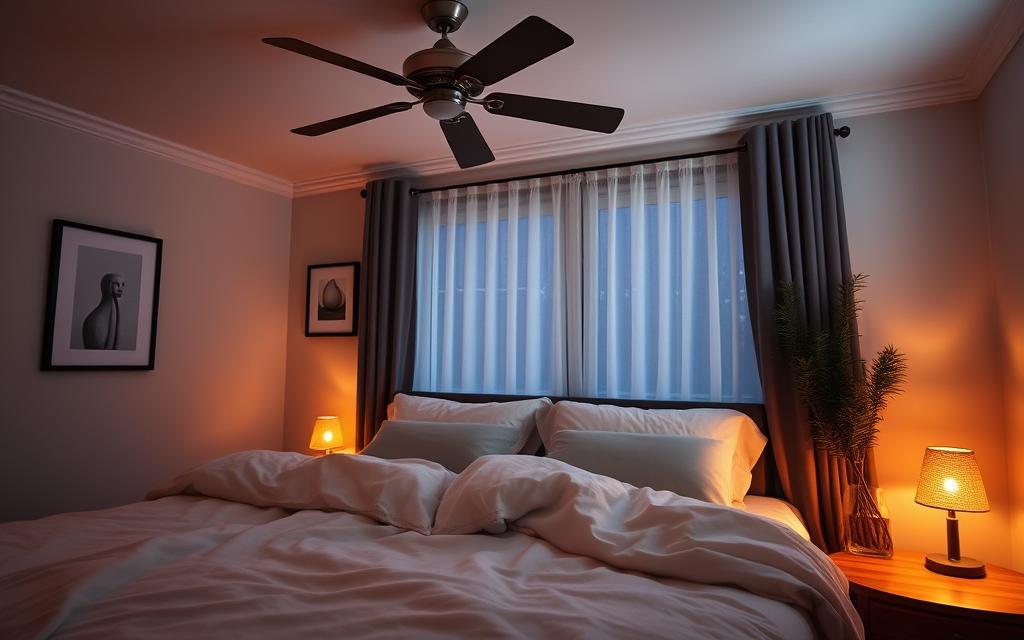
The Role of Light in Sleep Quality
Light is key to good sleep and health. Artificial light at night messes with our body clocks and hurts sleep. Studies show that artificial light stops melatonin production, making it hard to sleep6.
Daylight and indoor light are very different. Daylight can be up to 10,000 lux, but office lights are only 500 lux7. Knowing this helps us sleep better.
To sleep well, we should avoid light in the evening. Turning off screens two hours before bed helps8. Blackout curtains and dim lights also help. These steps reduce blue light’s effects on our body clocks6.
Getting natural light in the day also improves sleep. People who get bright light before noon sleep better8.

- Limit screen time in the evening.
- Implement blackout curtains for complete darkness.
- Utilize red light in the evening to avoid disruptions.
- Ensure at least 15 minutes of natural light exposure after waking.
Tips for Perfect Sleep: Reducing Noise Levels
Creating a peaceful sleep environment is key to better sleep. Noises like traffic, snoring, or household sounds can disrupt sleep. Studies show that poor sleep hygiene and too much noise can cause health problems. It’s important to tackle these issues for good sleep910.
Types of Noises That Disrupt Sleep
Common noises that can mess with sleep include:
- Traffic sounds from nearby roads.
- Snoring from partners or other household members.
- Electronics and appliances running at night.
- Outside disturbances, such as dogs barking or music playing.
People who are sensitive to sound often have broken sleep. This can harm both mental and physical health11.
Effective Noise Reduction Techniques
Using effective noise reduction methods can greatly improve sleep. Here are some tips:
- Use white noise machines or fans to create a steady sound that covers up other noises.
- Wear earplugs to block out sounds that might wake you up.
- Install soundproof windows or heavy curtains to cut down on outside noise.
- Create a bedtime routine that helps you relax, making it easier to ignore small noises.
Studies show that white noise machines can cut down sleep disruptions by about 70%. This leads to a more peaceful night’s sleep10.
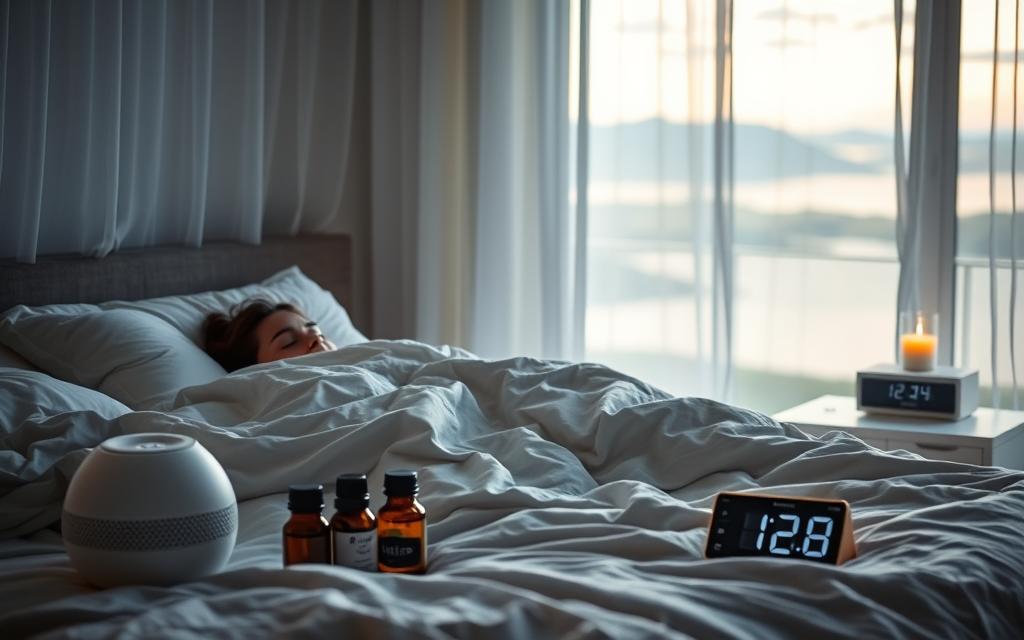
Choosing the Right Mattress for Your Sleep Style
Finding the right mattress is key to better sleep. Most adults need seven to eight hours of sleep each night to feel good12. Knowing which mattress type fits your sleeping position can make a big difference. If you wake up sore, it might be time for a new mattress12.
When checking out a mattress, try lying down for a while. This helps you really feel how comfortable it is.
Sleeping Positions and Mattress Types
Your sleep position affects the best mattress for you. Side sleepers do well with softer mattresses to ease pressure. Back and stomach sleepers might like firmer ones for spine alignment.
Foam mattresses adjust well to different body shapes and weights. Innerspring mattresses are often cheaper13. Some mattresses are made for specific body types, showing how important it is to find the right one for you.
Importance of Upgrading Old Mattresses
It’s important to update your mattress regularly for good sleep. Experts say to change it every ten years for the best support and comfort12. If you sleep better elsewhere, it’s time for a new one12.
Prices for mattresses vary a lot. You need to find a balance between cost and quality for better sleep. A good mattress can greatly improve your sleep and health.
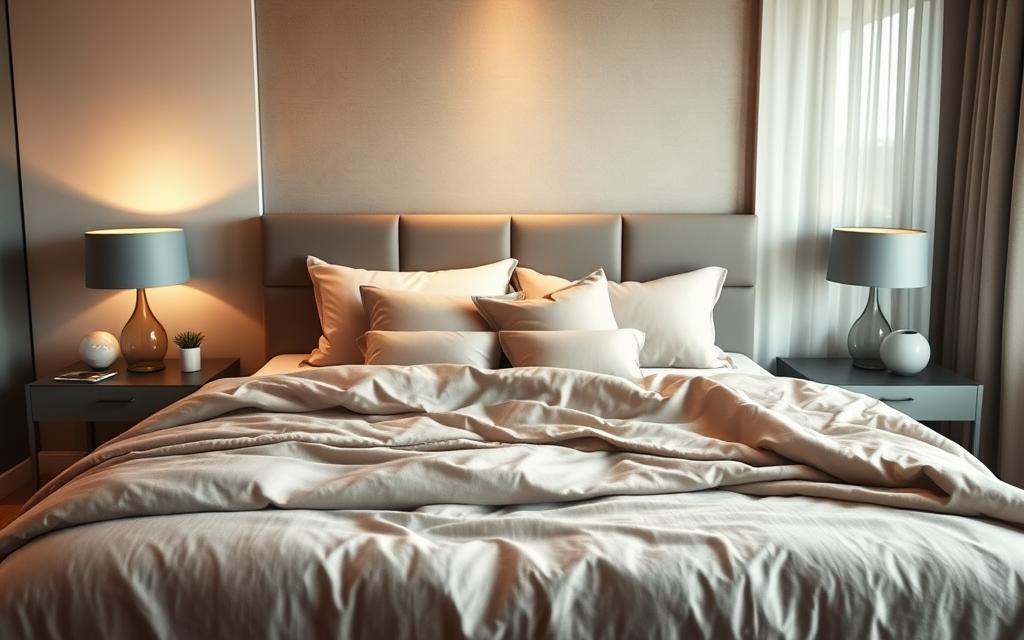
Enhancing Comfort with Quality Bedding
Choosing quality bedding is key for comfort and sleep hygiene. The right sheets and pillow boost comfort and help sleep better. It’s important to pick materials that breathe well and match your preferences for a good night’s sleep.
Choosing the Right Sheets and Pillow
For warm sleepers, pick sheets that wick away moisture. Cold sleepers might prefer heavier fabrics for warmth. Sleep experts say a bedroom temperature of 60 to 67 degrees Fahrenheit is best for comfort and sleep14.
A pillow that fits well is essential for neck support. Side sleepers like soft to medium pillows, while stomach and back sleepers prefer medium to firm ones.
Considerations for Allergies
Allergies can really mess with your sleep, affecting over 35% of allergy sufferers15. Hypoallergenic bedding can help. The American Academy of Asthma, Allergy, and Immunology says 55% of Americans have allergies, making hypoallergenic bedding crucial15.
It’s also smart to replace your mattress every 5 to 8 years for comfort and to avoid allergens. A mattress topper can add extra comfort without needing a new mattress.
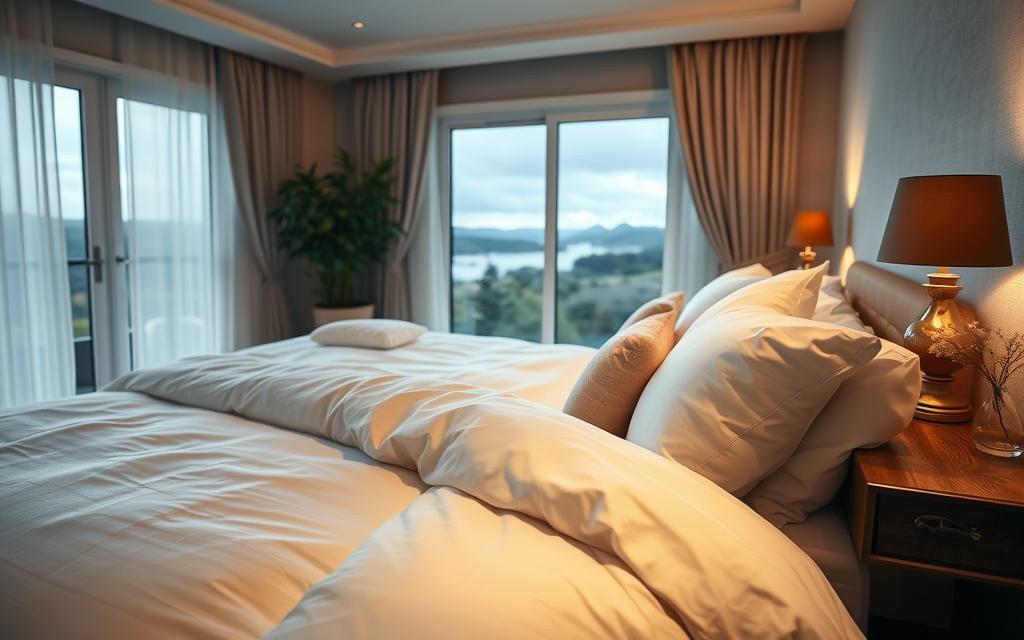
Embracing the Use of Aromatherapy
Aromatherapy is known to help you relax and sleep better. It has a long history, with essential oils like lavender and chamomile being great for sleep. These oils can make you feel better, reduce stress, and help you recover faster while you sleep16. Using essential oils before bed can help your body relax, leading to better sleep.
Essential Oils That Promote Sleep
Lavender is the top choice for sleep because it calms you down17. Other oils that help with sleep include:
- Cedarwood oil, which lowers adrenaline levels
- Roman Chamomile, which eases stress and tension
- Ylang-Ylang, which helps reduce anxiety
- Bergamot, a calming citrus oil unlike other citrus oils
Trying out these oils can help you relax and get ready for sleep.
Methods for Incorporating Scents
There are many ways to use essential oils in your bedtime routine. Here are some good practices:
- Use a diffuser 30 minutes to an hour before bed for the best effect.
- Put 2-4 drops of oil on a cotton ball or tissue around the room.
- Make a mist with 10-15 drops of oil and one ounce of water for your pillows or sheets.
- Add essential oils to your bath for extra relaxation.
- Try blends like “Rest and Relax” with Roman Chamomile, Cedarwood, and Lavender for a peaceful night.
Keep essential oils in dark glass bottles to keep them effective17. Always talk to a doctor before using them regularly. Adding these natural sleep aids to your routine can greatly improve your sleep.
Creating a Decluttered, Relaxing Space
Keeping your bedroom tidy is key for a good night’s sleep. Clutter can cause stress, leading to sleep problems. A messy room can overwhelm your senses, making it hard to relax and sleep well18.
The condition of your space greatly affects how you unwind and sleep. It’s a simple fact that a clean room helps you sleep better.
Impact of Clutter on Sleep
About 70% of people think a messy bedroom makes it hard to relax19. Feeling guilty about a messy room can also mess with your sleep. Almost 60% of people feel this way19.
So, cleaning up your space can help with insomnia and anxiety caused by poor sleep.
Tips for Keeping Your Bedroom Tidy
- Adopt a minimalist style. Using calming colors in your bedroom can help you relax18.
- Use smart storage to keep things hidden and organized.
- Add indoor plants like aloe vera and succulents. They clean the air and reduce stress18.
- Keep electronic devices out of your bedroom to avoid blue light and improve sleep19.
- Use blackout blinds to block light and sleep better by about 30%19.
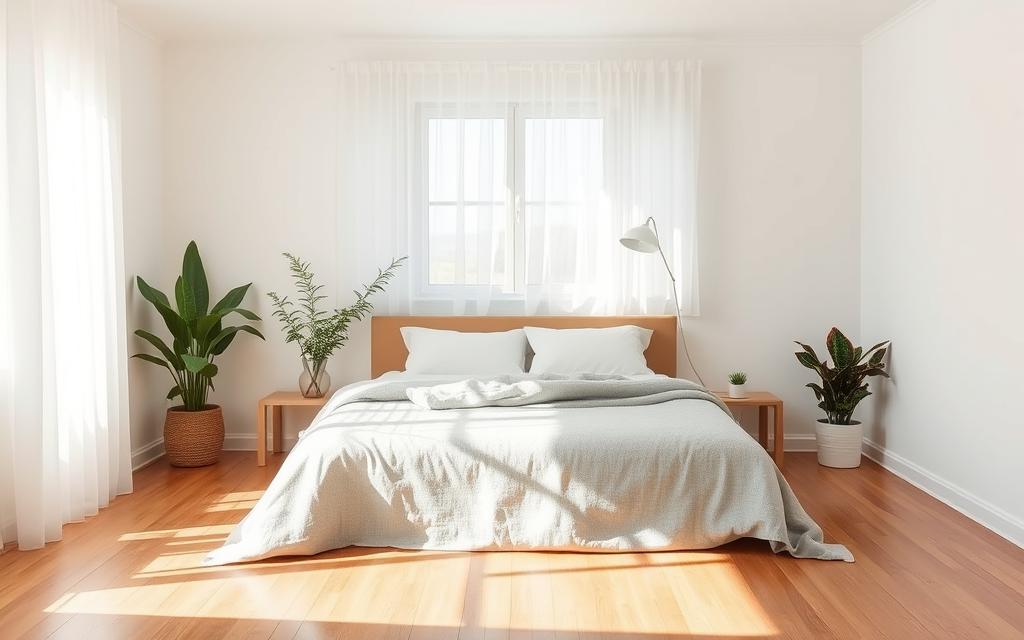
Utilizing Natural Remedies for Sleep Improvement
Looking into natural sleep remedies can help improve sleep quality. Options like melatonin, valerian root, and herbal teas might work well. Using these could be a great way to get better sleep.
Popular Natural Sleep Aids
Melatonin helps control the sleep-wake cycle and works best before bed. Research shows it can cut down on how long it takes to fall asleep. Most people find 0.1 to 0.3 milligrams effective20. It’s safe for short-term use, up to three months20.
Valerian root might also help you fall asleep faster. But, there’s not much proof it works for insomnia20. People usually use it for a month or six weeks. Some might experience mild side effects20. But, kava can be risky, causing liver problems21.
Research on Effectiveness of Natural Remedies
Studies show melatonin helps older adults with insomnia sleep better and feel more alert in the morning21. But, valerian hasn’t been proven to improve sleep quality over placebos21. Herbal teas like chamomile haven’t shown to help with insomnia in trials, despite being popular21.

Visual Appeal: The Effect of Color on Sleep
Colors greatly affect our mood and sleep quality. Choosing the right colors for your bedroom can make a big difference. They help create a calm space for better sleep.
Studies show certain colors can relax us, which is key for good sleep. Blue and green are great for a peaceful atmosphere. They help us sleep longer and more soundly. Blue walls can calm the brain, and light blue, green, and yellow encourage relaxation and sleep2223.
Recommended Colors for the Bedroom
- Blue: Often considered the best color for sleep, blue can lower heart rate and blood pressure, supporting relaxation and serenity23.
- Green: Associated with renewal and rest, green reduces anxiety and contributes to waking up feeling refreshed23.
- Light Neutrals: Cream, beige, and light gray are recommended by Feng Shui principles, creating a balanced and inviting environment2223.
- Soft Pink: Promotes warmth and comfort, aiding in the ability to unwind23.
Choosing Calming Decor
When decorating for sleep, avoid bright colors like loud reds and oranges. They can make us feel more awake. Instead, keep your bedroom tidy and clutter-free for a calm space. Blackout curtains can also help block out light, improving your sleep.
Choosing the right colors and decor creates a peaceful room. This supports healthy sleep habits and helps us relax better.
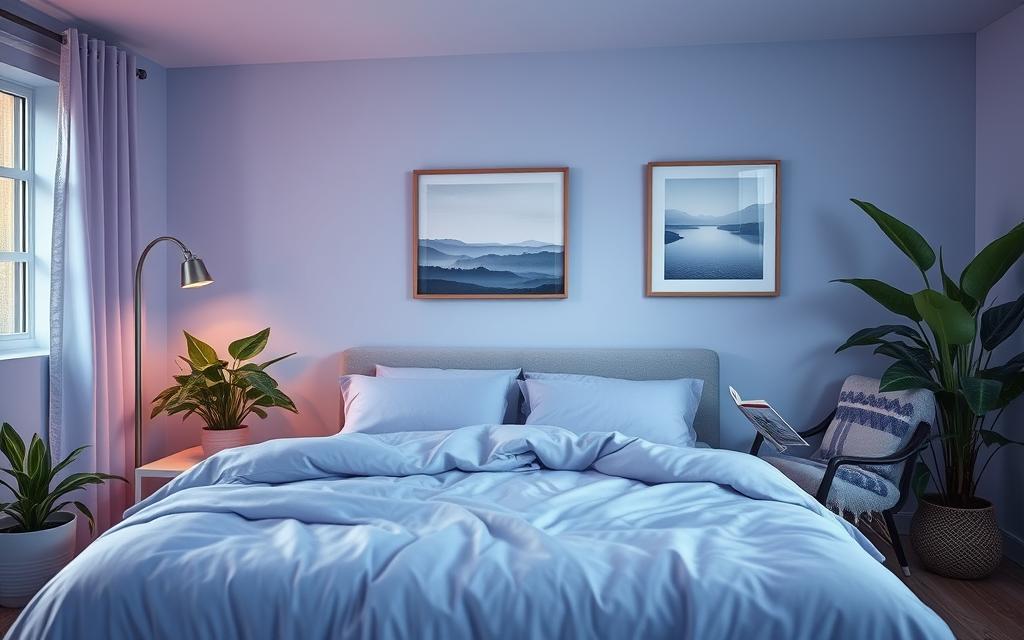
Maintaining Good Sleep Hygiene
Good sleep hygiene is key for a good night’s sleep. Keeping your sleeping area clean can greatly improve your sleep. Washing your bedding regularly helps get rid of dust mites and allergens that can mess with your sleep.
By following these tips, you can create a sleep-friendly environment. This helps you sleep better and feel more refreshed in the morning.
Regular Cleaning for a Healthy Sleep Environment
Cleaning your sleeping area regularly is important. Vacuuming and washing curtains can help keep dust away. It’s also good to wash your bedding once a week to cut down on allergens.
Caring for Bedding and Mattresses
Looking after your bedding and mattress is crucial. Mattresses over 10 years old might not support your body well, affecting your health24. Flipping or rotating your mattress can stop it from sagging, which is good for sleep25.
Cleaning your pillows often can also make your sleep better. Adults need 7–9 hours of sleep each night for good health25.
| Practice | Frequency | Benefits |
|---|---|---|
| Wash Bedding | Weekly | Reduces allergens and dust mites |
| Vacuum Room | Biweekly | Minimizes dust accumulation |
| Clean Mattress | Every 3 months | Prevents sagging and improves support |
| Replace Pillows | Every 1-2 years | Maintains head and neck support |
Implementing a Relaxing Bedtime Routine
Creating a calming bedtime routine tells your body it’s time to relax. It helps you develop healthy sleep habits. Studies show that a good bedtime routine lasts 30 to 60 minutes before sleep26.
By following specific steps, you can create a sleep-friendly environment. Knowing what to avoid helps make your bedtime routine even better.
Steps for a Conducive Pre-Sleep Routine
- Reading for just six minutes before bed can reduce stress by half27.
- Mindfulness or relaxation for 10 minutes can stop you from tossing and turning for hours27.
- A warm bath an hour before bed helps your body temperature drop, making it easier to sleep26.
- Deep, slow breathing calms your nervous system and gets your body ready for rest28.
- Limiting caffeine and avoiding screens before bed is key, as screens can mess with your sleep27.
Activities to Avoid Before Bed
- Try to avoid screens, as they can lower melatonin levels and make it hard to fall asleep26.
- Stay away from stimulating activities and intense talks to keep your mind calm28.
- Don’t have caffeine or heavy meals close to bedtime for better sleep27.
- Keep your space tidy to avoid distractions and ensure a peaceful sleep environment26 and28.
Conclusion
Creating the right sleep environment is key for better sleep and overall health. Factors like temperature, light, noise, and bedding quality play a big role. By focusing on these, people can greatly improve their sleep.
Adjusting bedding and bedroom temperatures can lead to better sleep. This is shown by the growing need for personalized sleep advice in recent years29.
Good sleep habits are also important. The UK National Health Service promotes mental well-being through better sleep29. Simple steps like avoiding caffeine before bed and keeping a cool bedroom can improve sleep, studies show30.
By following these tips, people can not only sleep better but also live better. It’s all about valuing and protecting sleep.
As more people see how sleep affects their lives, using effective sleep strategies will become a big part of staying healthy.
FAQ
Why is a sleep environment important for sleep quality?
A good sleep environment is key to better sleep. Things like temperature, light, noise, and bedding affect your sleep. They also impact your overall health.
What is the recommended temperature for optimal sleep?
Keeping your bedroom at 60 to 67 degrees Fahrenheit is best for sleep. Everyone is different, so adjust your bedding and fabrics for comfort.
How does artificial light affect sleep onset?
Blue light from screens can stop melatonin production, making it hard to fall asleep. Try to avoid screens before bed and use blackout curtains.
What are effective ways to reduce noise during sleep?
Noises like traffic or snoring can disrupt sleep. Use sound machines, earplugs, or white noise devices to make your sleep area quieter.
How do I choose the right mattress for my sleep style?
Pick a mattress that fits your sleeping position for comfort and spinal alignment. A new mattress can improve your sleep and reduce nighttime disturbances.
What considerations should I have when selecting bedding?
Choose breathable, hypoallergenic fabrics for comfort and health, if you have allergies. A good pillow also supports your neck.
How can aromatherapy help improve sleep?
Essential oils like lavender and chamomile are calming. Use them in your bedtime routine with diffusers or sprays to relax your body.
What is the impact of clutter on sleep quality?
Clutter can cause stress and distractions, making it hard to relax. A clean bedroom helps you relax and sleep better.
Are there natural remedies to support better sleep?
Yes, natural sleep aids like melatonin, valerian root, and herbal teas can help. They are often safer than medicines.
What colors should I choose for my bedroom to promote relaxation?
Use calming colors like blue, green, and soft neutrals. The right colors can help you relax and sleep better.
How can I maintain good sleep hygiene?
Clean your bedding regularly to remove allergens and dust mites. Also, take care of your mattress and pillows for better sleep.
What should be included in a relaxing bedtime routine?
A calming bedtime routine signals your body to relax. Try reading, meditation, or warm baths. Avoid screens and caffeine before bed.
Source Links
- How to Make a Sleep-Friendly Bedroom – National Sleep Foundation – https://www.thensf.org/how-to-make-a-sleep-friendly-bedroom/
- Bedroom Environment: What Elements Are Important? – https://www.sleepfoundation.org/bedroom-environment
- 6 steps to better sleep – https://www.mayoclinic.org/healthy-lifestyle/adult-health/in-depth/sleep/art-20048379
- Best Temperature to Sleep: Research and Sleep Tips – https://www.healthline.com/health/sleep/best-temperature-to-sleep
- Can’t Sleep? Adjust the Temperature – https://www.webmd.com/sleep-disorders/features/cant-sleep-adjust-the-temperature
- Sleeping With the Lights On: Helpful or Harmful? | Sleep Foundation – https://www.sleepfoundation.org/bedroom-environment/sleeping-with-the-lights-on
- Light and Sleep – https://www.sleepfoundation.org/bedroom-environment/light-and-sleep
- Get Morning Light, Sleep Better at Night – https://www.webmd.com/sleep-disorders/features/morning-light-better-sleep
- 20 Tips for How to Sleep Better – https://www.sleepfoundation.org/sleep-hygiene/healthy-sleep-tips
- Mastering Sleep Hygiene: Your Path to Quality Sleep – https://www.sleepfoundation.org/sleep-hygiene
- 15 Proven Tips to Sleep Better at Night – https://www.healthline.com/nutrition/17-tips-to-sleep-better
- Choosing the Right Mattress: Making a Smart Investment – https://www.hopkinsmedicine.org/health/wellness-and-prevention/choosing-the-right-mattress-making-a-smart-investment
- Choose the Right Mattress for Better Sleep – Consumer Reports – https://www.consumerreports.org/home-garden/mattresses/buying-guide/
- Improve Your Sleep Quality with Luxury Bedding – https://www.peacockalley.com/blogs/the-linenry/how-to-improve-sleep-quality?srsltid=AfmBOoo0hr51wHYW6WhqNboqbwBRmZbawKzKIxpMyGX7mdFFmx2dJsI7
- Sleep Tips & Bedding to Sleep Better | The Company Store – https://www.thecompanystore.com/sleep-tips-bedding-guide.html
- Magic Of Aromatherapy For Sleep – https://sleepycat.in/blog/magic-of-aromatherapy-for-sleep/?srsltid=AfmBOookPNYWf9mMkO5GhtU4p3IkjmLPlIJHfoR4_pmrsUgoiIUVO0RD
- Using Aromatherapy for Better Sleep – https://www.stearnsandfoster.com/stearns-foster-stories/using-aromatherapy-for-better-sleep/?srsltid=AfmBOoq2JMMCect942HyBEUrPD2Qjw_iK0Z3umTn7WbZITUIAutwGX_j
- Declutter Your Bedroom for Better Sleep! — Simplicity & Sunshine – https://www.simplicityandsunshine.com/blog/declutter-your-bedroom
- How to Improve Your Sleep with a Clutter-Free Bedroom – Simply Enough – https://www.simplyenough.net/goodnight/
- Natural Sleep Aids and Remedies – https://www.webmd.com/women/natural-sleep-remedies
- 9 Natural Sleep Aids to Get Better Sleep – https://www.verywellhealth.com/natural-ways-to-help-you-sleep-88230
- Best Bedroom Colors for Sleep: Is Anything Proven to Work? – https://www.healthline.com/health/best-bedroom-colors-for-sleep
- Best (and worst) bedroom colors for a good night’s sleep — Calm Blog – https://www.calm.com/blog/best-bedroom-colors-for-sleep
- 12 Tips for Better Sleep Hygiene – https://www.healthline.com/health/sleep-hygiene
- Sleep Hygiene Tips for a Better Night’s Rest – https://health.clevelandclinic.org/sleep-hygiene
- Bedtime Routines for Adults – https://www.sleepfoundation.org/sleep-hygiene/bedtime-routine-for-adults
- How to Sleep Better with a Bedtime Routine – https://www.heart.org/en/healthy-living/healthy-lifestyle/sleep/how-to-sleep-better-with-a-bedtime-routine
- How to create the ideal bedtime routine for adults — Calm Blog – https://www.calm.com/blog/bedtime-routine-for-adults
- The ‘5 principles’ of good sleep health – https://pmc.ncbi.nlm.nih.gov/articles/PMC9285041/
- How to Get the Perfect Night’s Sleep – eachnight – https://eachnight.com/sleep-studies/get-perfect-sleep/
